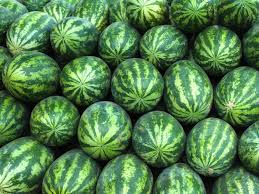Watermelon is valued for its juiciness and sweet taste, which are best revealed chilled. However, not everyone can enjoy their pleasant taste. You need to know how to choose a sweet watermelon. Useful properties of watermelon The birthplace of watermelon is South America. The fruit has been known since the time of Ancient Egypt – watermelons were left in the tombs of the pharaohs as food for the afterlife, which shows that the wonderful taste of the fruit was highly valued in ancient times. Watermelon consists of 90-95% water, so it normalizes the body’s water balance, protects against dehydration and heat stroke. The large amount of water has a positive effect on the functioning of the kidneys and urinary tract in general, helps to remove salts, thus preventing the formation of stones. Because watermelons contain large amounts of potassium and magnesium, they have a positive effect on the cardiovascular system. Watermelon is deservedly considered a powerful antioxidant, as it perfectly removes toxins and significantly reduces the level of bad cholesterol. The sweet fruit is rich in vitamins B1, B2, C, PP, E, A, calcium, phosphorus, iron, sodium, folic acid and vitamin C.
How to choose a well-ripened watermelon? Probably each of us has bought or tasted a bad watermelon at least once in his life. It is difficult to identify a good product at first glance, so people often come across green or overripe fruit. However, there are some secrets that will help you always choose juicy and sweet watermelons. The maturity of the watermelon can be determined by its sound. Tap your fingers. You should feel a clear sound. A beautiful watermelon always resonates! Pull the handle. Unripe watermelons usually have green twigs. There is a pattern between the size of the fruit and its quality. Large fruits are almost always juicier and sweeter. At the same time, too large shapes also do not always show good quality. The ideal weight of a watermelon is 6-10 kg. It is better to buy watermelons with bright stripes that contrast sharply with each other. The stronger the contrast, the tastier and juicier it is. Watch out for a yellow spot on the side, which indicates that the watermelon is ripe. Choose women’s watermelons. Yes, watermelons also have sex. They are round and sweet. Also pay attention to the brown spots on the skin, which also suggest a well-ripened watermelon.
Zuhra Pavlova, a candidate of medical sciences and endocrinologist at Moscow State University, explained what watermelon lovers should be afraid of. Many people mistakenly believe that these are nitrates, said the doctor. According to her, “it is still rare to come across a nitrate-poisoned watermelon in the middle of the season.” “Nitrate poisoning was relevant half a century ago, when watermelons were much more expensive than fertilizers,” the doctor explained, adding that there would be no problems with nitrates if you chose a fruit without suspicious spots and lumps on the surface.
“The most dangerous thing in watermelon is fructose. And this is a scientific fact,” said Zuhra Pavlova. This leads to a risk of overweight and obesity, “warned the endocrinologist. She explained that it is very easy to deal with excess fructose.” You should always eat watermelon as a dessert – no more than 200-300 grams in quantity. You do not need to expand your stomach with large amounts of fruit – over the years its elasticity decreases and you may risk getting a “watermelon belly”, the doctor advises.







